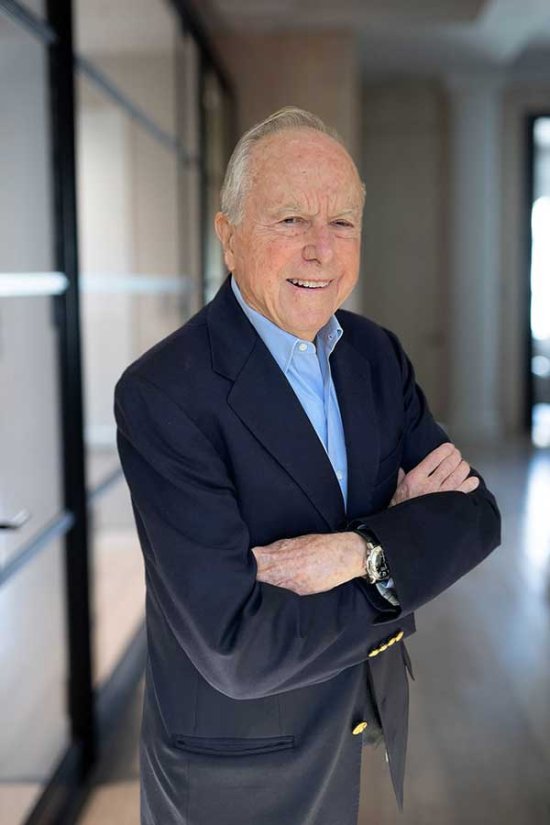
Marc Benioff remembers entrepreneur and innovator Sandy Roberson.
A couple of years after I started Salesforce, I was invited to a special dinner to celebrate a friend’s marriage. The location was the home of Sandy Robertson, a Silicon Valley legend. I was thrilled. I’d always wanted to meet Sandy. A native midwesterner who saw the tech revolution coming years before the Wall Street establishment, he was present at the creation of Silicon Valley, shaping the financial infrastructure that fueled its remarkable rise.
We hit it off immediately, finding chemistry in our shared passion for everything from technology to modern art and our love for Hawaii. We also discovered that our offices were in the same building–1 Market Street in San Francisco–and made a plan to get together there the next day. Sandy, as ever, showed up right on time. I spontaneously asked if he would consider joining our board. Just as spontaneously, he said yes, beginning a friendship and mentorship that spanned some two decades, until Sandy sadly passed away Aug. 3 at the age of 93.
[time-brightcove not-tgx=”true”]In an industry of outsized personalities, Sandy kept a low profile. But there are few people in the world of tech whose career touched so many people and so many companies. Curiosity and a genuine interest in others were keys to his success in being able to spot the next big thing. It was why as a young manager in Smith Barney’s Chicago office, he had jumped at the chance to move to San Francisco. “With four hours’ notice I came to the West Coast,” he told a podcaster a few years ago. “I really got turned on by the people I met in Silicon Valley—the entrepreneurs and the scientists and the engineers.”
Over more than six decades, a period that saw Silicon Valley transform from a collection of semiconductor companies to a global technology hub, Sandy seemed to have a finger in everything. That was in part because of his unbridled enthusiasm about innovation and innovators. The list of companies he helped grow was as broad as it was long: Gilead Sciences, eBay, Sun Microsystems, Dell, AOL, Pixar, E*TRADE and many more.
One history of Silicon Valley called Sandy “the genesis of investment banking in San Francisco.” Often overlooked is Sandy’s record as a serial entrepreneur in his own right. He founded not one but two of the four firms–the so-called Four Horsemen–that long dominated Silicon Valley banking: Robertson, Coleman, Siebel & Weisel, which became Montgomery Securities, and Robertson, Stephens & Company, which later sold to Bank of America. In 1999, he again co-founded his own firm, Francisco Partners, which has invested in more than 450 tech companies. To play that kind of role in a major industry once is remarkable; to do it repeatedly is almost unheard of.
Sandy’s enthusiasms–“the joy thing,” as our mutual friend Bob Grady rightly calls it–extended well beyond tech to the arts, sports and philanthropy. He was a major donor to UCSF, inspiring me to do the same, and to his alma mater the University of Michigan, even setting up an endowment for a football offensive coordinator for the Wolverines. He relished his later-in-life role as Broadway impresario, investing in productions including Hamilton, Spamalot, Leopoldstadt, Cinderella, An American in Paris and this season’s Suffs. Another passion was thoroughbred horseracing, where he also saw his share of wins–and found lessons for life and business.
Sandy was once asked in an interview for the Computer History Museum whether people or ideas matter most in making investing decisions. “Some people in venture capital say it’s a question of betting on the jockey or the horse,” the interviewer said. “It’s the jockey. No question about it,” Sandy answered without missing a beat. “Pick the right person.”
For countless entrepreneurs and innovators down the decades looking to build the companies that transformed our world, Sandy Robertson was exactly the right person, no question about it–the jockey who guided us, steered us, and helped us run faster and farther than we ever thought possible.
TIME Ideas hosts the world's leading voices, providing commentary on events in news, society, and culture. We welcome outside contributions. Opinions expressed do not necessarily reflect the views of TIME editors.